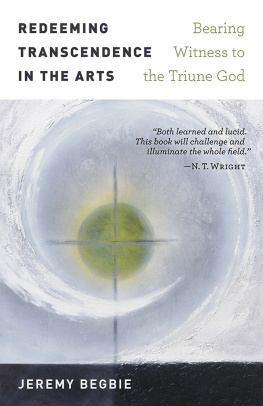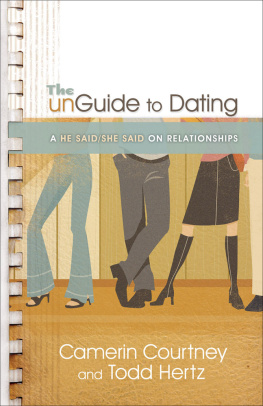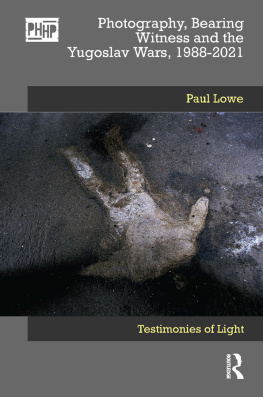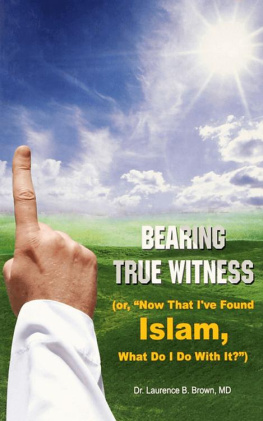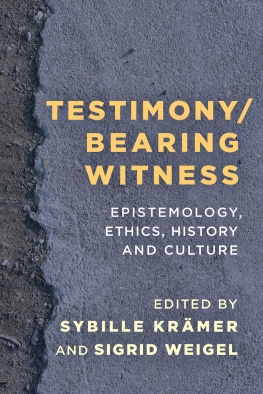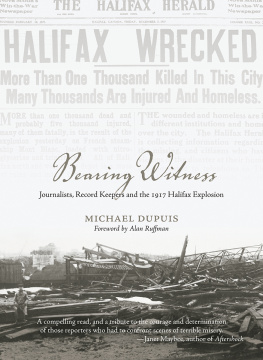Campbell Courtney S. - Bearing Witness
Here you can read online Campbell Courtney S. - Bearing Witness full text of the book (entire story) in english for free. Download pdf and epub, get meaning, cover and reviews about this ebook. year: 2019, publisher: Wipf and Stock Publishers, genre: Religion. Description of the work, (preface) as well as reviews are available. Best literature library LitArk.com created for fans of good reading and offers a wide selection of genres:
Romance novel
Science fiction
Adventure
Detective
Science
History
Home and family
Prose
Art
Politics
Computer
Non-fiction
Religion
Business
Children
Humor
Choose a favorite category and find really read worthwhile books. Enjoy immersion in the world of imagination, feel the emotions of the characters or learn something new for yourself, make an fascinating discovery.

- Book:Bearing Witness
- Author:
- Publisher:Wipf and Stock Publishers
- Genre:
- Year:2019
- Rating:5 / 5
- Favourites:Add to favourites
- Your mark:
- 100
- 1
- 2
- 3
- 4
- 5
Bearing Witness: summary, description and annotation
We offer to read an annotation, description, summary or preface (depends on what the author of the book "Bearing Witness" wrote himself). If you haven't found the necessary information about the book — write in the comments, we will try to find it.
Bearing Witness — read online for free the complete book (whole text) full work
Below is the text of the book, divided by pages. System saving the place of the last page read, allows you to conveniently read the book "Bearing Witness" online for free, without having to search again every time where you left off. Put a bookmark, and you can go to the page where you finished reading at any time.
Font size:
Interval:
Bookmark:
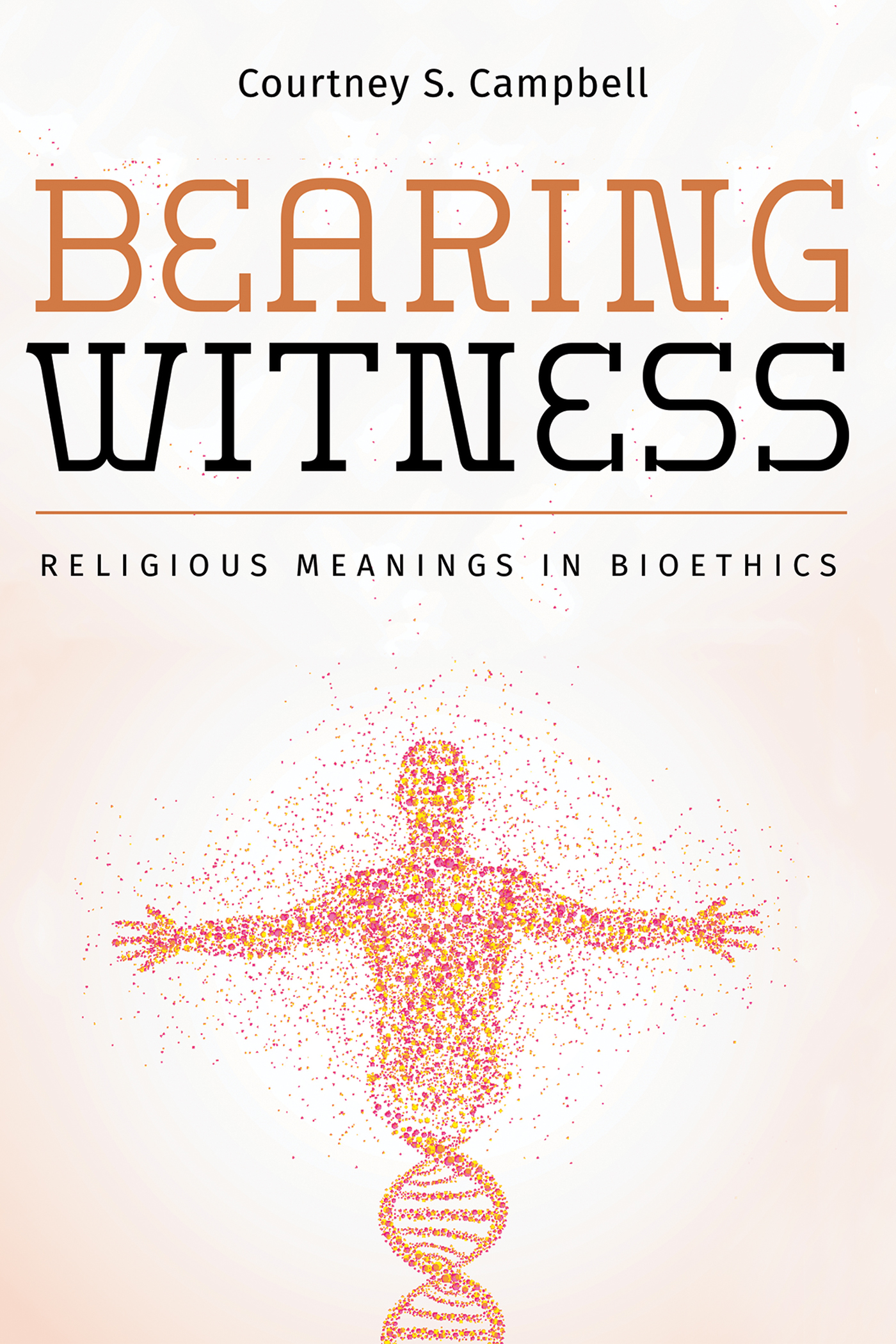
Religious Meanings in Bioethics
Courtney S. Campbell

I was nearing the end of a presentation and discussion on ethical issues at the end of life at an academic medical center when a thoughtful questioner laid down the so what? gauntlet to me: I can see how your analysis would be interesting to scholars in your discipline, but what difference will this make in caring for patients? Our conversation was a threshold moment for the development of this book. I have lived in the academic, pedagogical, professional, institutional, policy, and personal worlds of bioethics for the past three decades, and as fascinating as those conversations, classrooms, and conferences have been, I have always understood that ideas matter in the real world of experiences and decisions that all of us encounter in health and medical care. I have conceptualized my professional work to comprise a kind of calling to wrestle with difficult questions and concepts that inform and can transform persons, choices, and policy structures. I have wanted to affirm the authority of moral experience.
This vocational interpretation has underscored my interest in exploring the different implications of religion, and the study of religion, for the fields of bioethics and the health humanities. My argument in this book is that religious traditions are, among other things, communities of ongoing moral discourse and practice, and they are thereby essential rather than peripheral contexts for envisioning, interpreting, and enacting the ideas bioethics has affirmed as central to our common understandings of health and medicine. I make claims that religious traditions engage in bearing witness to various cultures of bioethics, insightful ways of constructing ideas that matter about the nature of the human person, the stories we tell in communities, the moral mission of medicine as a calling and vocation dedicated to healing, and our earnest quests for meaningfulness through the ordeals of suffering and mortality. Those are questions and ideas that matter to all of us, regardless of religious affiliationor, increasingly in the United States, of no religious affiliation at all.
My introductory chapter, Witnessing Meaning in Bioethics, identifies how ideas matter by beginning with a very personal account of a medical issue that confronted my mother and her three children and then explicates several meanings of bearing witness in medicine and bioethics: the person as an image-bearer of the divine ( imago Dei ), narrative meaning, a covenantal commitment of healing, and empathic presence in bearing burdens, including suffering, compassionate presence, encountering mortality, and prophetic and conscientious critique in public and professional life. It provides the intellectual and experiential infrastructure for the subsequent discussions. Chapter presents an exposition of ways the relation between religion and bioethics has been constructed historically, including the recent postures of bioethical indifference and hostility to religion embedded in the culture wars. I start there because if I cant make a case for how religious traditions and discourse can make compelling contributions to bioethics, if religious concepts and ideas dont matter or are divorced from policy deliberations, there would not seem much point to further analysis.
Chapters and expand further on my fundamental metaphor of religious ethics as bearing witness. I address the theme of bearing the image of the person through an exposition of moral features of the imago Dei , which highlights concepts of agency, caring, covenant, creativity, embodiment, equality, gift, narrative, relationship, and stewardship. Chapter addresses the moral witness of bearing the story, using the New Testament parable of the Good Samaritan to illustrate how narratives and stories bear witness to questions of meaning in bioethics discourse. As the late physician-writer Paul Kalanithi articulated in his moving memoir When Breath Becomes Air , narratives provide the richest material for moral reflection. My analysis underscores how the story-borne witness opens up the kinds of questions that need to be asked in bioethical deliberations and manifests the potency of symbolic forms of rationality embedded in religious tradition.
Chapters through expand on the moral witness of bearing burdens by turning a moral focus to the professional commitments of medicine. My analysis takes seriously that medicine (and nursing) is a profession oriented by a commitment to healing. I seek to situate the ethics of medicine more as a professional art of healing that complements scientific and technical knowledge; more on transforming identities and less on transactional exchanges; and more about the meaning of medicine as a calling and vocation informed by covenant and less by contract. Healing integrally includes ways in which the human and professional community bears compassionate witness to suffering. My discussion of bearing witness to suffering emphasizes the multivalent nature of this existential experience: suffering is an evil that shatters a persons world and identity, and yet an ordeal that contains re-storying and transformative possibilities.
Chapters and situate the witness of the healer and of covenanted communities in bearing mortality and end-of-life experience with the dying patient. I explore the meaning of witness to both failures and possibilities about dying well. I also examine the ways physician aid-in-dying is assuming increasing appeal for dying patients, their advocacy groups, and medical professionals, and is now reconstructed as medical aid in dying. I am both critical of conservative dismissals of physician-assisted dying and of philosophical and professional arguments that make hastening death a new end of medicine.
My discussion of ethical responsibilities regarding physician-assisted death marks a transition in argumentation from the personal, clinical, and professional to the public and civic cultures of bioethics. Chapters and examine how bioethics offers an illustrative window on the increasingly contested and complex public and professional influence of religious perspectives and symbols. I find it problematic for bioethics to be portrayed as a proxy for the wars of culture between political liberalism and conservative religion or for culture to be invoked as a hegemonic term that eclipses the social or public witness of religious traditions. These ongoing disputes indicate that both the culture and bioethics are increasingly under the sway of instrumental rationality and problem-solving to such an extent that religious discourse and tradition is supplanted in public and professional life, leaving some with recourse only to conscience-based objections.
In developing some of my interpretative analysis, arguments, and claims, I make recourse on occasion to the moral and communal resources of my own religious tradition, Latter-day Saint. A reliance on a rather distinctive set of sources, such as sacred writings considered heterodox at best, or heresy, by other Christian thinkers, or practices deemed offensive and outrageous by social commentators or philosophical writers, are nonetheless important for my own reflection on many bioethics issues. I am not aware, other than a few scattered articles of my own in bioethics publications, of the presence of Latter-day Saint perspectives in academic bioethics. My interpretations will not always reflect the conventional wisdom of bioethics or of religious bioethics, as I have found myself often on the cusp of an insider-outsider dialectic in relation to many different professional cultures and moral communities. Still, I invite the reader to keep an open mind as I draw on diverse and resonant sources to explicate the meanings of bearing witness in bioethics.
Font size:
Interval:
Bookmark:
Similar books «Bearing Witness»
Look at similar books to Bearing Witness. We have selected literature similar in name and meaning in the hope of providing readers with more options to find new, interesting, not yet read works.
Discussion, reviews of the book Bearing Witness and just readers' own opinions. Leave your comments, write what you think about the work, its meaning or the main characters. Specify what exactly you liked and what you didn't like, and why you think so.

